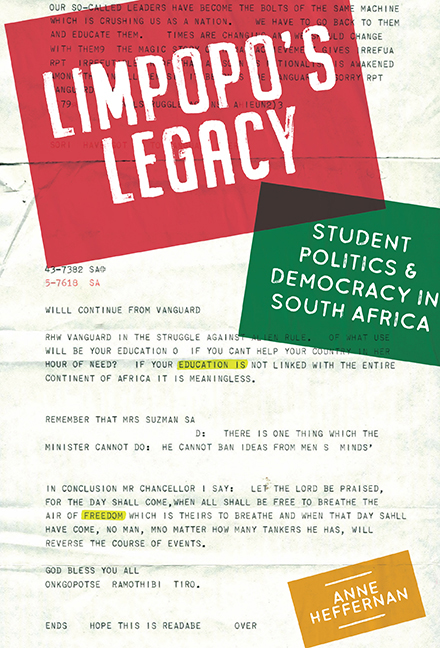Book contents
- Frontmatter
- Dedication
- Contents
- Acknowledgements
- Abbreviations and Acronyms
- Map of the north-eastern Bantustans showing the location of Limpopo
- Introduction
- 1 Turfloop, Crucible of Change
- 2 Centre of the Storm
- 3 Africanization: The New Face of Turfloop
- 4 Black Consciousness in Decline
- 5 Congresses and Comrades
- 6 Populism and the New Youth League
- 7 Julius Malema and Youth Politics in the New Limpopo
- Epilogue: Legacies of Limpopo
- Bibliography
- Index
4 - Black Consciousness in Decline
Published online by Cambridge University Press: 23 July 2019
- Frontmatter
- Dedication
- Contents
- Acknowledgements
- Abbreviations and Acronyms
- Map of the north-eastern Bantustans showing the location of Limpopo
- Introduction
- 1 Turfloop, Crucible of Change
- 2 Centre of the Storm
- 3 Africanization: The New Face of Turfloop
- 4 Black Consciousness in Decline
- 5 Congresses and Comrades
- 6 Populism and the New Youth League
- 7 Julius Malema and Youth Politics in the New Limpopo
- Epilogue: Legacies of Limpopo
- Bibliography
- Index
Summary
Student politics in South Africa underwent seismic shifts between 1976 and 1980. In early 1976 the South African Students’ Organisation (SASO) remained a major force on black campuses, while its graduates and proponents preached Black Consciousness ideology in schools in some of the country's biggest urban townships. As I argued in Chapter 2, this period marked the height of Black Consciousness’ prominence, especially among its student constituency. But, though its impact on South African youth was critical, the student movement was still not considered a central force in liberation politics either by government or by the more established liberation organizations; it represented one element of the resistance against apartheid, alongside the armed struggle, liberation organizations in exile, and trade union movements.
After June 1976 that changed irrevocably. School students in Soweto had shown their country and the world the importance and power of student organization and politics. Protesting against the use of Afrikaans as a classroom medium, they took to the streets of Soweto in tens of thousands. Confronted with armed police, they continued to march until they were fired upon and brutally repressed. The Soweto uprising and its aftermath – when students across the country made their schools and campuses ungovernable – changed the public perception of students in South Africa. It also changed the dynamics of resistance politics in the country. No single liberation organization had been prepared for the scope and scale of the uprising, and the way organizations like SASO and the African National Congress (ANC) dealt with the aftermath would have an important effect on the future shape of student and liberation politics.
Another critical factor impacting this future was government repression, which increased significantly on the organizations that existed under the umbrella of Black Consciousness in the late 1970s. By late 1977 the killing of Steve Biko in a Pretoria jail and mass bannings diminished the capacity of the Black Consciousness Movement (BCM) to influence student politics at the level it had achieved just a year or two earlier. Into the breach, and influenced by all these factors, the multi-racial Charterist politics of the ANC began a resurgence in new student political movements, bringing with it a new wave of student activism for the 1980s.
- Type
- Chapter
- Information
- Limpopo's LegacyStudent Politics & Democracy in South Africa, pp. 127 - 148Publisher: Boydell & BrewerPrint publication year: 2019



